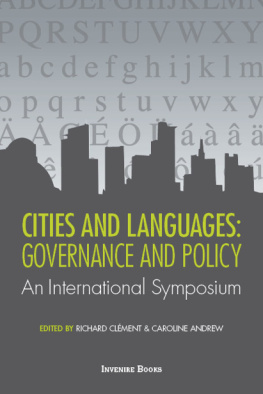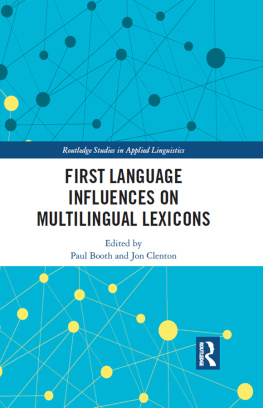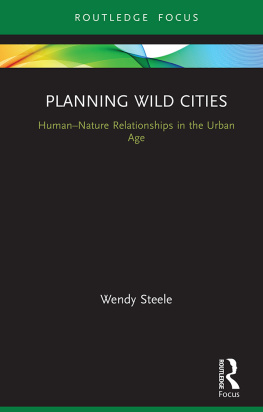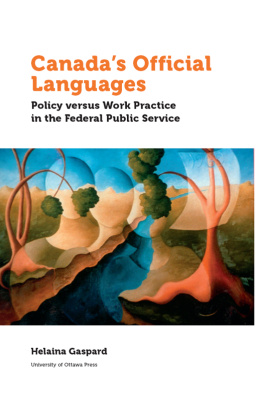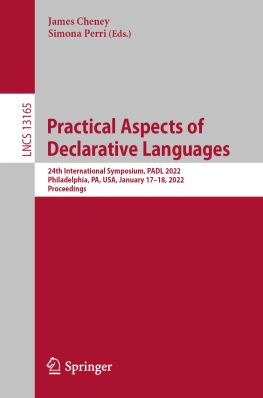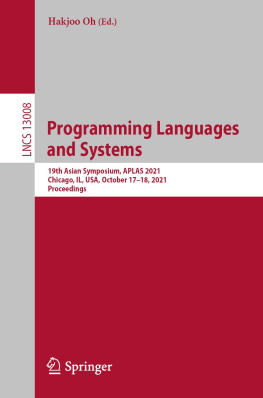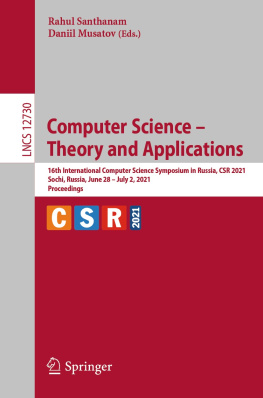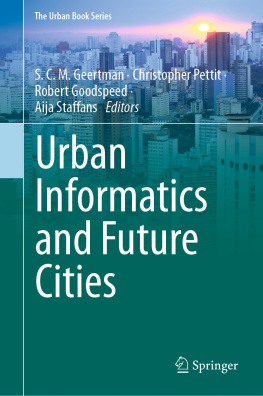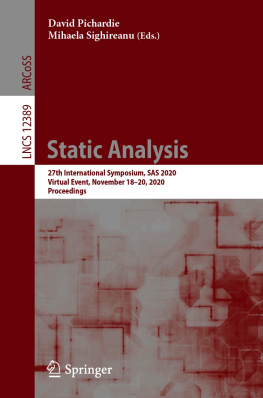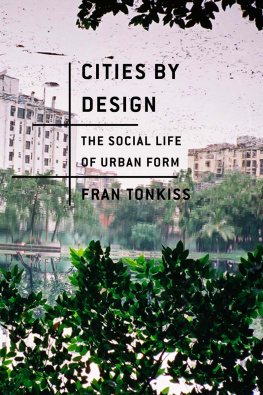Cities and Languages:
Governance and Policy
An International Symposium
Invenire Books
Invenire is an Ottawa-based idea factory specializing in collaborative governance and stewardship. Invenire and its authors offer creative and practical responses to the challenges and opportunities faced by todays complex organizations.
Invenire Books welcomes a range of contributions from conceptual and theoretical reflections, ethnographic and case studies, and proceedings of conferences and symposia, to works of a very practical nature that deal with problems or issues on the governance and stewardship front. Invenire Books publishes works in French and English.
This is the eleventh volume published by Invenire Books.
Invenire also publishes a quarterly electronic journal, found at www.optimumonline.ca.
Editorial Committee
Caroline Andrew
Robin Higham
Ruth Hubbard
Daniel Lane
Gilles Paquet (Chair)
The titles published by Invenire Books are listed at the end of this book.
Cities and Languages:
Governance and Policy
An International Symposium
Edited by
Richard Clment & Caroline Andrew
Proceedings of the international symposium,
Language Planning in Capitals and Urban Environments,
held March 25-26, 2010 at the University of Ottawa, with sponsorship from the Official Languages and Bilingualism Institute, Canadian Heritage, the Office of the Commissioner of Official Languages and the City of Ottawa
Invenire Books
Ottawa, Canada
2012
Invenire Books 2012
Library and Archives Canada Cataloguing in Publication
International Symposium Language Planning in Capitals and Urban Environments: Practices and Challenges (2010: Ottawa, Ont.)
Cities and languages: governance and policy/edited by Richard Clment & Caroline Andrew.
Proceedings of the International Symposium Language Planning in Capitals and Urban Environments: Practices and Challenges, held March 25-26, 2010 at the University of Ottawa.
Issued also in French under title: Villes et langues.
Includes bibliographical references.
Issued also in electronic format.
ISBN 978-0-9877575-0-0
1. Language planning--Europe--Congresses. 2. Language planning--Canada--Congresses. 3. Language policy--Europe-- Congresses. 4. Language policy--Canada--Congresses. 5. Capitals (Cities)--Europe--Congresses. 6. Capitals (Cities)--Canada-- Congresses. I. Clment, Richard, 1951- II. Andrew, Caroline, 1942- III. Title.
P40.5.L352E85 2012 306.4494 C2012-900519-3
Invenire Books would like to gratefully acknowledge the financial contribution to this project of the Commissioner of Official Languages of Canada, the Department of Canadian Heritage and the City of Ottawa.
All rights reserved. This book may not be copied or stored in any information retrieval system, in whole or in part, without the written permission of the copyright owner.
Published by Invenire
P.O. Box 87001
Ottawa, Canada K2P 1X0
www.invenire.ca
Cover design by Sandy Lynch
Cover image by Zig8 | Dreamstime.com
Layout and design by Sandy Lynch
Printed in Canada by Marquis Imprimeur Inc.
Distributed by:
Commoners Publishing
631 Tubman Cr.
Ottawa, Canada K1V 8L6
Tel.: 613-523-2444
Fax: 613-260-0401
sales@commonerspublishing.com
www.commonerspublishing.com
Preface
Language Planning in Capitals
and Urban Environments
Graham Fraser, Commissioner of Official Languages of Canada
O ver 40 years ago, Canada took decisive action concerning the countrys linguistic future. By adopting the Official Languages Act , the country chose to go against the trend toward homogeneity, and made equality of English and French a fundamental principle of Canadian society that the federal government had to advance, respect and promote. Enacted in the wake of the Royal Commission on Bilingualism and Biculturalism (the Laurendeau-Dunton Commission), which sought to shed light on the malaise felt by francophones in the country, the 1969 act marked the beginning of a new chapter in the history of the relationship that Canadian anglophones and francophones have with their government.
Four decades later, there is no longer any doubt that linguistic duality is a fundamental part of Canadian society. Over the years, it has shaped the way Canadians see themselves. It has also shaped the way Canada presents itself to the world: as a bilingual country that celebrates its linguistic duality by devoting as much of its energy to the French-speaking world as it does to the Commonwealth. Many individual representatives, from majority and minority communities and government organizations and institutions, have worked hard to make significant progress in advancing the equal status of both language communities.
Other individuals are now asking themselves how they can contribute to the Canadian linguistic duality. At the same time, some observers are trying to mobilize new players who are often deeply affected by Canadian linguistic duality but not very involved in promoting it. This led to the idea of holding an international symposium on cities and language planning.
In the same spirit as the Laurendeau-Dunton Commission, which focused on the international scene to better understand the Canadian language situation and put it into perspective, the Language Planning in Capitals and Urban Environments symposium sought to bring together administrators and researchers from Canadian and European cities to discuss language planning in urban environments. Initiating this dialogue was all the more important because current theoretical and practical knowledge on the subject is somewhat inconsistent and disjointed.
The exercise proved to be extremely productive. I found the breadth and depth of the presentations, discussions and ideas to be inspirational. Despite the sometimes very disparate circumstances and approaches, everyone came away with a better understanding of the issues. A number of topics were covered, from immigration to the role of the private sector, to the need to encourage dialogue between language communities. I would like to focus for a moment on one topic in particular: municipal bilingualism as a distinguishing asset.
As much through its architecture, its aromas and its climate as through its inhabitants, each city acquires an image and an identity. A citys image seems to matter more and more these days, whether it has evolved over time without any real planning or has been deliberately created. Thus, it was only a matter of time before municipal governments started to examine the image that their cities were projecting. If administrations are not proactive in creating an image for their city, then it is likely that citizens and visitors will do it for them.
During the symposium, some administrators and researchers invited cities to focus on their linguistic capital. Municipal bilingualism should be perceived as an asset that deserves to be promoted, rather than merely a question of regulation. Bilingualism is a symbol of openness and inclusion that cities can use to distinguish themselves from their neighbours.
By placing linguistic duality at the heart of its identity and image, a city encourages language communities to participate fully in its social, cultural and economic life, and inspires citizens and visitors alike to discover its many treasures.
Approaching municipal bilingualism as an asset to be promoted requires strong leadership and the ongoing cooperation of municipal authorities, the private sector and the community. Everyone must participate because everyone stands to gain. Promoting linguistic duality such that it becomes an integral part of a citys image and identity leads to major commercial, economic and cultural returns. It also fosters tourism and makes inhabitants feel proud to live in a city that reflects who they are. The benefits go beyond the merely symbolic.
Next page
